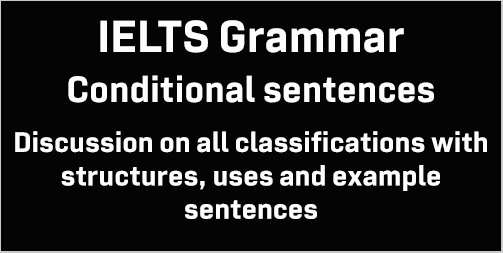IELTS Grammar: Conditional sentences; with structures, uses, example sentences
Conditional sentences are statements that explain general truth, hypothetical situations, and their outcomes. According to the grammatical structure, conditional sentences are complex sentences. This means the use of conditional sentences in IELTS Writing and speaking results in higher bandscore.
Generally, a complete conditional sentence contains two clauses, one principal clause and one subordinate clause. Also, one of the clauses explains a condition and the other explains the consequence.
Here are some factors about conditional sentences:
- There are four types of conditional sentences.
- As each of the conditional sentences expresses varying meanings, using the correct structure is important. So, learners should pay attention to the ‘verb-form’ in conditional sentences.
- There’s a use of comma when the if-clause or when-clause precedes the principal/main clause.
So, what are the types of conditional sentences?
Well, as mentioned before, there are four types:
- Zero conditional
- First conditional
- Second conditional and
- Third conditional
Let’s have a closer look at each of the types.
Zero conditional sentences:
Zero conditional sentences express general truths. This means these sentences state situations in which one thing/matter always causes another (the result is guaranteed). These are not any specific information; these are universal information that applies to everyone in the world.
Let’s have a look at a prominent quote from the movie ‘Sherlock Holmes – A Game of Shadows’:
When Sherlock Holmes – the genius private detective meets his arch-enemy Professor Moriarty, Moriarty says at one point,
“The laws of celestial mechanics dictate that when two objects collide, there is always damage, of a collateral nature.”
Here, take a look at the bold section of the long sentence:
When two objects collide, there is always damage.
This is an example of a zero conditional.
Here’s the grammatical structure of the sentence:
| Condition clause | Consequence/result clause |
| If / When + present simple | present simple |
Let’s take a look at some other examples:
If it rains, the soil and grass get wet.
When we eat, we obtain energy.
When water freezes, it becomes ice.
Plants die if they do not get water.
Look at all the sentences. All of them are general truths. They are not about any specific person or place or matter.
You can’t say:
If Robin joins us, our team benefits.
That will be grammatically incorrect because Robin is a specific person. To make the sentence correct, we have to use the First Conditional Sentence.
First conditional sentences:
First conditional sentences are those sentences that express possible situations in which the result is likely to take place in the future. However, the result is not guaranteed here. It may happen, or, may not happen.
Let’s take a look at some examples:
If you try heart and soul, you will succeed.
If Rebecca plays well, her team will go to the finals.
Here’s the grammatical structure of the sentence:
| Condition clause | Consequence/result clause |
| If / When + present simple | shall / will + Verb in base form |
Here are some other examples:
If the City Council passes the new act, local people will become furious.
If the police find the criminal’s son, the case will take a new turn.
If we do exercise regularly, we will feel more energetic eventually.
Here’s another grammatical structure of the sentence:
| Condition clause | Consequence/result clause |
| If / When + present simple | may / can + Verb in base form |
If she comes to the party, I may not go.
I can help you if you want.
We can solve the problem if the government supports our cause.
Second conditional sentences:
We use second conditional sentences to express outcomes that are completely impossible to occur or, not likely to happen in the future.
Let’s take a look at some examples:
If I had the chance, I would travel to the moon.
If she survived the attack, she might return here for her revenge.
I could come to an aid if I were informed earlier.
Here’s the grammatical structure of the sentence:
| Condition clause | Consequence/result clause |
| If + past simple | would / could / might + verb in base form |
Let’s take a look at some other examples:
If I were you, I would visit Palermo.
If Lisa had the opportunity, she might give me her car forever.
If the Local Council held him responsible, he could not make that fortune with his business.
Third conditional sentences:
We use third conditional sentences to express that present circumstance would be different, if something different had happened in the past, but it didn’t happen.
Let’s take a look at some examples:
If I hadn’t eaten so much, I wouldn’t have become so fatty.
This sentence suggests that I did eat a lot, and as a consequence, I became very fatty. So, third conditionals are somewhat repent or regret for past events.
Here’s the grammatical structure of the sentence:
| Condition clause | Consequence/result clause |
| If + past perfect | would have/ could have/ might have + Verb in past participle form |
Here are some more examples:
She would have become a teacher if she had not joined the Air Force. (This means she became something else because she joined the Air Force.)
If I had played well, my team would have moved to the finals. (This means I did not play well and my team could not move to the finals.)
I hope this post has helped you understand different conditional sentences. I’ll be happy if you provide me a rating for the post and make comments below.




Thank you very much this helps me to get ielts 6.5 score
Wow!
I feel honoured !
Best of luck in your future endeavors!